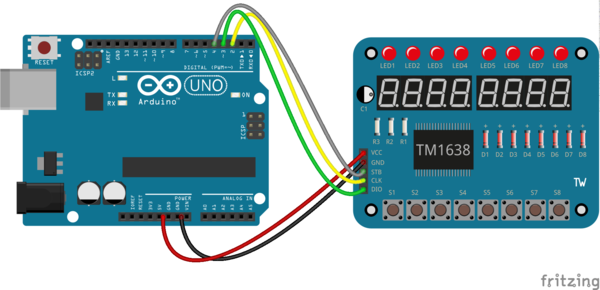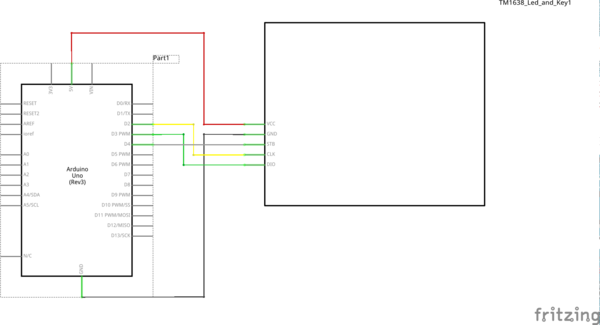LED-Key Modul am Arduino
Version vom 31. Januar 2020, 20:26 Uhr von ElabPeter (Diskussion | Beiträge) (→Programm für den Arduino)
Anschluss des HC-SR04 an den Arduino
zum Anschluss des LED-Key Board an ein Arduino Board werden drei I/O Pins benötigt.
Programm für den Arduino
Das Arduino Programm gibt einen Timer auf der 7-Segment-Anzeige aus. Es werden die TM1368 und die LKM1638 Bibliothek benötigt.
/* JY-LKM1638 board v1.1 demo
*
* Required libraries:
* https://github.com/Erriez/ErriezTM1638
* https://github.com/Erriez/ErriezLKM1638
*/
#include <ErriezLKM1638Board.h>
// Connect display pins to the Arduino DIGITAL pins
#if ARDUINO_ARCH_AVR
#define TM1638_CLK_PIN 2
#define TM1638_DIO_PIN 3
#define TM1638_STB0_PIN 4
#elif ARDUINO_ARCH_ESP8266
#define TM1638_CLK_PIN D2
#define TM1638_DIO_PIN D3
#define TM1638_STB0_PIN D4
#elif ARDUINO_ARCH_ESP32
#define TM1638_CLK_PIN 0
#define TM1638_DIO_PIN 4
#define TM1638_STB0_PIN 5
#else
#error "May work, but not tested on this target"
#endif
// Create LKM1638Board object
LKM1638Board lkm1638(TM1638_CLK_PIN, TM1638_DIO_PIN, TM1638_STB0_PIN);
static uint8_t led = 0;
static uint8_t dir = 1;
static LedColor color = LedRed;
static uint8_t ledDelay = 0;
static uint8_t ledDelayInit = 30;
static bool countEnable = false;
static bool countUp = true;
static unsigned long countValue = 0;
static uint8_t countDelay = 0;
static uint8_t countDelayInit = 10;
static uint8_t brightness = 2;
// Function prototypes
static void handleButtons(void);
static void handleLEDs(void);
static void handleDisplay(void);
void setup()
{
Serial.begin(115200);
while (!Serial) {
;
}
Serial.println(F("JY-LKM1638 demo"));
Serial.println(F("Press a button:"));
Serial.println(F(" SW1: Start/stop counting"));
Serial.println(F(" SW2: Reset counter"));
Serial.println(F(" SW3: Toggle increment/decrement"));
Serial.println(F(" SW4: Increment brightness"));
Serial.println(F(" SW5: Color LED speed up"));
Serial.println(F(" SW6: Color LED speed down"));
Serial.println(F(" SW7: Toggle direction color LED"));
Serial.println(F(" SW8: Toggle color LED red/green"));
// Initialize TM1638
lkm1638.begin();
lkm1638.clear();
lkm1638.setBrightness(brightness);
}
void loop()
{
handleButtons();
handleLEDs();
handleDisplay();
delay(10);
}
static void handleButtons(void)
{
static uint8_t keysMask = 0;
uint8_t keys;
// Get keys
keys = lkm1638.getButtons();
// Mask keys to execute increment or decrement state only when the switch is
// down the first time
if (keys == 0) {
keysMask = 0;
} else {
if (keysMask == 0) {
if (keys & 0x01) {
// Change color
if (color == LedGreen) {
color = LedRed;
} else {
color = LedGreen;
}
} else if (keys & 0x02) {
// Change direction
dir ^= 1;
} else if (keys & 0x04) {
// Speed down
if (ledDelayInit < 20) {
ledDelayInit += 2;
}
} else if (keys & 0x08) {
// Speed up
if (ledDelayInit > 2) {
ledDelayInit -= 2;
}
} else if (keys & 0x10) {
// Change display brightness
if (brightness == 7) {
brightness = 0;
} else {
brightness++;
}
lkm1638.setBrightness(brightness);
} else if (keys & 0x20) {
// Toggle count up/down
countUp ^= true;
} else if (keys & 0x40) {
// Clear count
countValue = 0;
} else if (keys & 0x80) {
// Toggle count enable
countEnable ^= true;
}
keysMask = keys;
}
}
}
static void handleLEDs(void)
{
if (ledDelay <= 4) {
ledDelay = ledDelayInit;
lkm1638.colorLEDsOff(0xff);
lkm1638.colorLEDsOn((uint8_t)(1 << led), color);
if (dir) {
if (led >= 7) {
led = 0;
} else {
led++;
}
} else {
if (led == 0) {
led = 7;
} else {
led--;
}
}
} else {
ledDelay--;
}
}
static void handleDisplay(void)
{
if (countEnable) {
if (countDelay <= 5) {
countDelay = countDelayInit;
if (countUp) {
if (countValue == 99999999) {
countValue = 0;
} else {
countValue++;
}
} else {
if (countValue == 0) {
countValue = (uint32_t)99999999UL;
} else {
countValue--;
}
}
} else {
countDelay--;
}
}
lkm1638.setPrintPos(0);
lkm1638.print(countValue);
}
